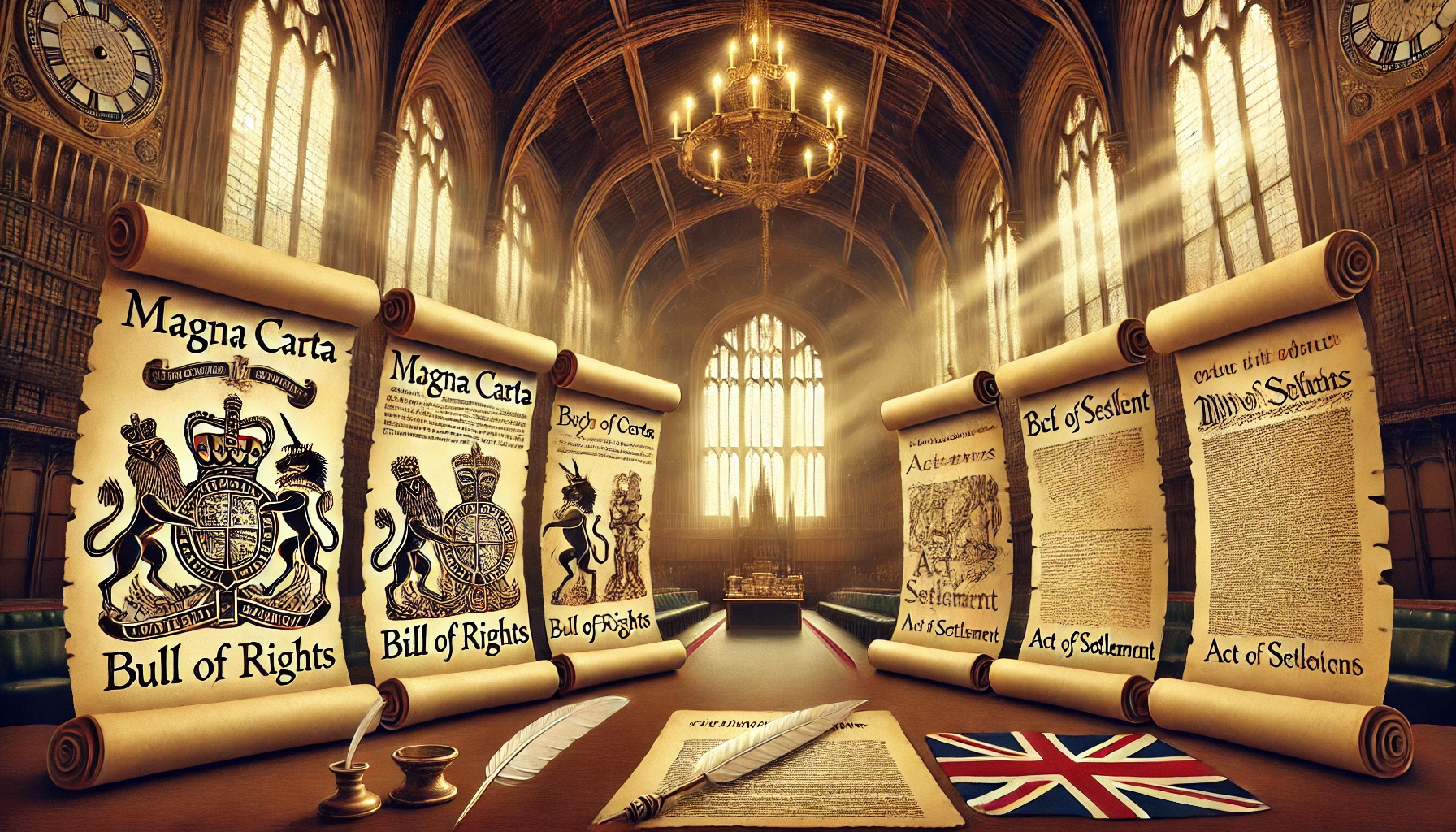The Evolution of the UK Constitution: Major Events and Constitutional Statutes
The UK’s constitution is not found in a single document but has evolved over centuries through key constitutional statutes that have shaped democracy, governance, and the balance of power.
Understanding these statutes is crucial for those challenging the executive and holding power to account. This post explores the major events that led to these constitutional milestones and their impact on the modern UK constitution.
1. Magna Carta (1215 & 1297) – The Birth of the Rule of Law
The Lead-Up
- King John faced widespread discontent due to heavy taxation, military failures in France, and arbitrary rule.
- The barons rebelled after years of abuses of power, including unlawful imprisonments and excessive demands for money.
- In 1215, the barons forced King John to negotiate a settlement, resulting in the Magna Carta.
Constitutional Impact
- Established the principle that no one is above the law, including the monarch.
- Introduced the right to fair trial and due process.
- Set a precedent for limiting executive power, influencing later democratic developments.
2. The Bill of Rights (1689) – The Foundation of Parliamentary Sovereignty
The Lead-Up
- King James II was overthrown in the Glorious Revolution (1688) due to his absolutist rule and attempts to restore Catholic dominance.
- Parliament invited William III and Mary II to take the throne but required them to accept constitutional limits on monarchical power.
Constitutional Impact
- Cemented parliamentary sovereignty by restricting monarchical power.
- Established the right to free elections, freedom of speech in Parliament, and protection from cruel and unusual punishment.
- Became a cornerstone of constitutional democracy, influencing later rights-based laws.
3. Act of Settlement (1701) – Securing Judicial Independence
The Lead-Up
- Fear of a Catholic monarch returning to power led Parliament to secure the Protestant succession.
- There were concerns about royal interference in the judiciary and political instability.
Constitutional Impact
- Confirmed that Parliament controlled the succession of the Crown.
- Strengthened the independence of the judiciary, a key pillar of the separation of powers.
- Paved the way for a constitutional monarchy, where the monarch’s power was increasingly ceremonial.
4. Acts of Union (1707 & 1800) – The Creation of the UK
The Lead-Up
- Economic struggles and failed colonial ventures (e.g., the Darien Scheme) pressured Scotland into union with England.
- England sought to secure the Protestant succession and prevent Scotland from aligning with France.
Constitutional Impact
- Established a unified Parliament, centralizing legislative power.
- Retained distinct legal and religious traditions for Scotland and Ireland, setting a precedent for modern devolution.
- The Ireland union was later undone in 1922, leading to the creation of the Irish Free State (now the Republic of Ireland).
5. Parliament Acts (1911 & 1949) – Limiting the Lords’ Power
The Lead-Up
- The House of Lords rejected the People’s Budget (1909), which aimed to tax the wealthy to fund welfare reforms.
- A constitutional crisis ensued, leading to new limits on the Lords’ power.
Constitutional Impact
- Removed the Lords’ power to veto money bills, ensuring the Commons had financial supremacy.
- Limited Lords’ ability to delay legislation, ensuring a more democratic law-making process.
- Reinforced the principle that elected representatives should have the final say in governance.
6. Representation of the People Acts (1918, 1928, 1969) – The Expansion of Suffrage
The Lead-Up
- The suffragette movement and World War I emphasised the need for greater democratic participation.
- Women’s contributions to the war effort strengthened demands for voting rights.
Constitutional Impact
- Transformed the UK into a fully representative democracy.
- Ensured that all adult citizens had the right to vote, aligning with democratic principles.
- Strengthened the concept of popular sovereignty, holding the executive accountable to the electorate.
7. European Communities Act (1972) & Repeal (2018) – EU Law and Brexit
The Lead-Up
- The UK sought economic integration with Europe after World War II.
- In 2016, the Brexit referendum led to the decision to leave the EU, culminating in the 2018 repeal of the 1972 Act.
Constitutional Impact
- Marked a shift in sovereignty while in the EU, as EU laws overruled UK laws where conflicts arose.
- The 2018 repeal reaffirmed Parliament’s control, demonstrating the UK’s ability to change its constitutional framework.
8. Human Rights Act (1998) – Incorporating the ECHR
The Lead-Up
- Post-World War II human rights abuses led to the creation of the European Convention on Human Rights (ECHR).
- The UK incorporated ECHR protections into domestic law to ensure stronger human rights safeguards.
Constitutional Impact
- Strengthened individual rights protections against government actions.
- Enabled courts to challenge legislation that breaches human rights, ensuring executive accountability.
- Remains a contested law, with debates about replacing it with a British Bill of Rights.
9. Constitutional Reform Act (2005) – Separation of Powers
The Lead-Up
- The lack of a clear separation between the judiciary and Parliament led to calls for reform.
- Judicial independence was seen as compromised by the Lord Chancellor’s role in all three branches of government.
Constitutional Impact
- Strengthened the separation of powers, ensuring the judiciary was fully independent.
- Created a modern constitutional court, improving legal clarity in constitutional disputes.
Conclusion: The Shaping of Modern Governance
Each of these constitutional statutes has played a critical role in shaping the UK’s legal and political system. They have established the rule of law, secured parliamentary sovereignty, expanded democratic participation, and ensured judicial independence.
For those challenging the executive, understanding these constitutional statutes is essential, as they provide legal foundations for holding power to account.
Stay tuned for a follow-up post exploring minor yet influential events that have further refined the UK constitution.














Post Comment